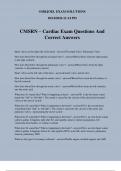©SIRJOEL EXAM SOLUTIONS
10/14/2024 11:14 PM
CMSRN – Cardiac Exam Questions And
Correct Answers
Heart valves on the right side of the heart - answer✔Tricuspid Valve, Pulmonary Valve
How does blood flow through the tricuspid valve? - answer✔Blood flows from the right atrium,
to the right ventricle
How does blood flow through the pulmonary valve? - answer✔Blood flows from the right
ventricle, to the pulmonary arteries
Heart valves on the left side of the heart - answer✔Aortic valve, mitral valve
How does blood flow through the mitral valve? - answer✔Blood flows from the left atrium, to
the left ventricle
How does blood flow through the aortic valve? - answer✔Blood flows from the left ventricle,
into the aortic arch
What does S1 sounds like? What is happening in heart? - answer✔S1 is the first heart sound
heard (the "lub" in "lub-dub"). The sound is caused by the closure of the mitral and triscupid
valves at the start of systole
What does S2 sound like? What is happening in the heart? - answer✔S2 is the second heart
sound heard (the "dub" in "lub-dub"). The sound is caused by the closure of the aortic and
pulmonic valves - representing the end of systole
What does S3 sound like? What is happening in the heart? - answer✔S3 is an extra heart sound,
called a gallop. It happens right after S2, and signifies atrial or mitral regurgitation, left
ventricular heart failure, or volume overload.
What does S4 sound like? What is happening in the heart? - answer✔S4 is an extra heart sound,
called a gallop. It happens before S1, and signifies HTN, acute MI, aortic stenosis, pulmonary
stenosis, pulmonary HTN
What are the types of coronary ischemia? - answer✔Stable angina, unstable angina, and AMI
, ©SIRJOEL EXAM SOLUTIONS
10/14/2024 11:14 PM
What interventions are needed for coronary ischemia? - answer✔Stress echo, nuclear perfusion
imaging or cardiac catheterization
What is stable angina? - answer✔Exercise-induced chest pain relieved by rest or nitroglycerin
What is unstable angina? - answer✔Angina that is either new in onset or differs from a patient's
typical stable angina pattern. Pain at rest does not respond to nitroglycerin. Precursor to MI.
What causes unstable angina? - answer✔Rupture of plaque with w/thrombus and incomplete
occlusion of coronary artery
What EKG changes are seen with unstable angina? - answer✔T-wave inversion, or ST
depression, occasionally ST elevation.
What are AHA core measures for chest pain? - answer✔EKG within 10 minutes, thrombolytic
within 30 minutes, cath-lab within 90 minutes
Classic signs/symptoms of MI - answer✔Chest pressure/pain, radiates to jaw/left arm, not
relieved by sublingual nitro, SOB, diaphoretic, pallor, anxiety, nausea/vomiting
Atypical MI symptoms - answer✔Fatigue, palpitations, dizziness, acute CHF, pulmonary edema,
silent myocardial ischemia, sudden cardiac arrest
Who is at risk for atypical MI presentation? - answer✔Women, eldery, diabetics
What does t-wave inversion indicate? - answer✔Ischemia
Pathologic q-wave - answer✔is wider than 0.04 seconds and indicates that a myocardial
infarction occurred in the past, and/or necrosis
Lab work for chest pain - answer✔CBC, PT/PTT, Chemistry panel, Troponin I, CK total and
CK-MB
CK-MB - answer✔Creatine Kinase-Muscle Breakdown
Elevated troponin - answer✔Indicative of any myocardial damage as enzymes are released (MI,
renal failure, pericarditis, myocarditis, tachycardia, heart failure, dilated or hypertrophic
cardiomyopathy). >0.40 is positive.
Inferior wall (posterior) MI - answer✔Involves Right Coronary Artery (Leads II, III and aVF)
Septal wall MI - answer✔Involves LAD (Leads V1 and V2)
Anterior wall MI - answer✔Involves LAD (Leads V2, V3, and V4)
, ©SIRJOEL EXAM SOLUTIONS
10/14/2024 11:14 PM
Lateral Wall MI - answer✔Involves Circumflex Artery (Leads I and aVL, V5 and V6).
STEMI standard therapies - answer✔M- Morphine
O- Oxygen
N- Nitrates
A- Aspirin
B - Beta blockers, ACE inhibitors, statins
Why are beta blockers given for MI? - answer✔They decrease myocardial demand and increase
filling time
Why are ACE inhibitors given for MI? - answer✔They help decrease left-ventricular
remodeling, help decrease afterload
Why are statins given for MI? - answer✔They are anti-inflammatory, usually given 12-24 hrs
after MI
What meds are given to prevent future MI? - answer✔Beta blockers, ACE inhibitors, statins
What variables do we monitor during chest pain for core measures? - answer✔EKG, Basic
hemodynamics (Cardiac output, stroke volume)
Preload - answer✔Amount of blood returning to the heart. Influences ventricular end diastolic
volume and fiber stretch.
Afterload - answer✔The force or resistance against which the ventricles must pump to eject their
blood volume.
Contractility - answer✔Myocardial tissue strength, influenced by preload and Starling's Law
Starling's Law - answer✔more the heart fills (stretches), the greater the strength of contraction.
(When overfilled, the contraction will weaken)
Sympathetic cardiac nerves - answer✔Increase HR and force of contraction (Release
norepinephrine, which affects beta 1 adrenergic receptors). Venous restriction increases venous
return to the heart and increases ventricular filling.
positive inotropic effect - answer✔An increase in the force of contraction of the heart muscle
(myocardium)
Parasympathetic cardiac nerves - answer✔vagus nerve / slows heart beat / lowers blood pressure
/ returns body functions back to "normal"




